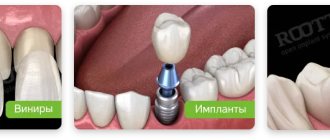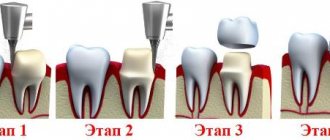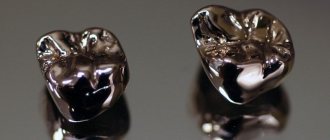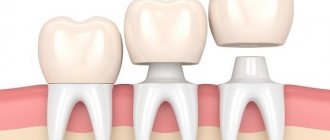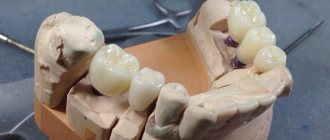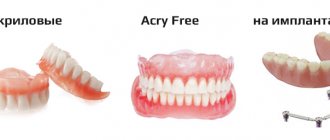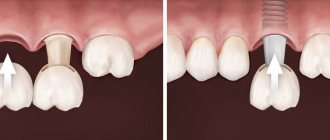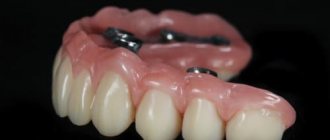When the need for dental prosthetics arises, the question arises - which crowns are best to install. Modern dentistry offers various options for dental crowns. They differ in material, purpose, and manufacturing technology. Each type has its pros and cons, each is recommended for certain indications.
Types of prostheses
Prostheses differ from each other in the materials that are included in their composition and the fixing elements. Modern dentistry divides removable dentures into:
- acrylic;
- nylon;
- clasp
Acrylic or plate dentures have been used in dentistry for a long time. They are voluminous and rigid, but at the same time light and unnoticeable. Due to the lack of teeth to which the orthopedic structure can be attached, a plate is made that is installed using suction or using special glue. This type is considered the most accessible and widespread.
The load when chewing falls on the gums and leads to their atrophy. To avoid this (to transfer the load to the bone and not harm the gums), it is better to use removable dentures on implants.
Nylon removable dentures are made from safer and more modern materials. They are more aesthetically pleasing than acrylic ones and more comfortable (they do not injure the gums, do not cause allergic reactions and do not absorb odors). Resistant to bacteria that cause inflammation.
Due to their softness, the systems also lead to bone tissue atrophy over time and cause pain when chewing solid food. Nylon dentures cannot be repaired. Their price is 2-3 times higher than acrylic.
Clasp dentures are reliable and durable, but they are not used for complete prosthetics. These are structures with a metal frame; several crowns are attached to an arch and attached to adjacent teeth using attachments or clasps.
Such a prosthesis provides an even load when chewing, does not cause discomfort, and does not cause complications on the gums. It is made from several types of materials (zirconium, acrylic, plastic, metal ceramics). When deformed, dentures can be repaired. This is the most expensive removable design.
What to pay attention to before prosthetics
To choose the most suitable denture, you need to consider the following parameters:
- Condition of the mucous membrane of the gums. Periodontitis is a contraindication to almost all types of prosthetics.
- Crown placement: reversal and crowding.
- Condition of the crowns. If the crown is destroyed and cannot be restored with composite materials, then it is reconstructed using an anatomical inlay.
- Stability of the root system.
- The condition of the tissues in the cervical region and the root part of the tooth.
- Size of the defective area.
- Location of the dental unit being restored. This is the determining factor when choosing a material for making crowns.
When choosing a type of prosthetics, it is necessary to evaluate not only the design features of the products and the financial component, but also the state of health. Fixed dentures cannot be inserted into everyone; many diseases are a contraindication to their installation. It is important not to hide them from the dentist. It is he who must determine which false teeth are best to insert in a particular case.
How to choose the right dentures
A properly selected prosthesis can improve the quality of life, restore a beautiful smile and a healthy appearance.
In case of complete absence of teeth, removable dentures on implants restore chewing function well and provide uniform load. This design is securely fixed. A cheaper option is plate dentures with suction cups.
In case of complete edentia, nylon dentures are not recommended; they have low suction ability and are difficult to chew solid food in.
In case of partial absence of teeth, clasp dentures have proven themselves well. They are firmly attached and distribute the load evenly.
The choice of prosthesis for the upper and lower jaws has its own characteristics. You can choose any suitable option for the upper jaw; it lends itself well to prosthetics due to the large palate. It is better to install a prosthesis on implants or a clasp prosthesis on the lower jaw, since the sublingual space is small and the fixation is worse.
Removable dentures are a good budget option for dental restoration. They are easy to care for. They effectively cope with their function and look aesthetically pleasing. In practice, acrylic, clasp dentures, Acry-free, QuattroTi have proven themselves well.
Five important questions about how to insert teeth
Before describing technologies for restoring lost teeth, we will briefly answer the most popular questions that interest almost all patients who are faced with the need for prosthetics for the first time.
- Do I need to replace teeth if I have lost them?
Dentists recommend doing this immediately and without fail. Even if the emptiness in the dentition is unnoticeable, do not delay your visit to the clinic. Lack of timely treatment leads to resorption of bone tissue, displacement of the dentition, deterioration of the bite, and can cause changes in the shape of the face and problems with the digestive system. - What teeth can be inserted?
Absolutely everything: natural incisors, canines, molars and premolars can be successfully replaced with dentures. - Does it hurt to put teeth in?
Many patients familiar with the methods of Soviet dentistry are concerned about the question of whether it hurts to insert teeth? We hasten to reassure you: modern methods of anesthesia make the treatment absolutely painless. - How long does it take to insert teeth?
It all depends on the treatment method, the efficiency of the doctors and the dental laboratory. Temporary teeth can be inserted in one visit; permanent dentures require more time. - What is the name of the doctor who inserts teeth?
The doctor who inserts teeth and performs prosthetics is an orthopedic dentist, but treatment and preparation for procedures is usually carried out by a whole team of specialists: dental surgeons, dental therapists, dental technicians.
Which denture is best for missing teeth?
Which orthopedic design is best used will depend on the individual characteristics of the patient and the number of remaining teeth.
For example, on the upper jaw, plastic dentures are fixed quite well. It will be impossible to fix it well on the lower jaw if mini-implants are not installed under the prosthesis.
If there is a complete absence of teeth in the upper jaw, it is better to choose a prosthesis made of acrylic, since due to the high elasticity of nylon there will be no suction effect.
Dentures made of plastic are more comfortable and effective when chewing than nylon ones, but nylon ones are thinner and lighter. They have better aesthetics in comparison with plastic and clasp ones, because the clasps of a nylon prosthesis are made of pink nylon, and the clasp ones are made of metal. However, clasps are easier to get used to and their service life is longer.
Features of microprosthetics with veneers
A veneer, on the other hand, is a thin piece of ceramic, about half a millimeter in length, that is bonded to a natural tooth to correct aesthetic problems such as abnormal pigmentation, fractures, or minor crookedness. Because these problems are of greatest concern in teeth that are visible when you smile, veneers are placed on all front teeth. The material is selected according to shade and shape to achieve the effect of natural teeth after they are installed.
Which material is better and will last longer?
The degree of reliability of fixation, comfort and aesthetics during use depends on the material from which removable dentures are made.
The main requirements for them include:
- strength;
- biocompatibility with human tissues;
- lack of toxicity, allergenicity, effects on taste and olfactory receptors.
Acrylic is the most popular and affordable material. It does not change its properties over time; acrylic dentures have good aesthetics. But it has a porous structure and can accumulate bacteria that cause inflammation.
Nylon is a lightweight and flexible material. Does not cause an allergic reaction and does not accumulate bacteria. Although it is durable, due to its softness and elasticity it quickly becomes unusable, so nylon dentures perform a good aesthetic function, but do not cope well with their intended purpose, chewing.
Acry Free is a modern material for removable dentures (translucent plastic that does not contain acrylic). It is elastic, does not injure the mucous membrane, and structures made from it are resistant to mechanical stress. This material is suitable for patients with allergies to metal or acrylic and with hypertonicity of the masticatory muscles. The service life of dentures made from it is longer than that of acrylic ones. The cost is higher than acrylic and lower than nylon and clasp.
Lumineers
Lumineers
A new direction in aesthetic dentistry has recently been the installation of lumineers . They are also called Hollywood teeth veneers. American manufactures and supplies such linings.
The plates are made from high-strength ceramics, the plate thickness of which is only 0.2-0.3 mm.
Installing lumineers, unlike ceramic veneers, has a number of positive aspects:
- before installing ultra-thin veneers, no heavy grinding of the tooth is required; only a minimal layer of enamel is removed;
- since the installation procedure does not require tooth preparation, therefore, it is painless and does not require anesthesia;
- resistance to mechanical loads, do not wear out over time;
- these linings are glued to a special composition insoluble in saliva, which contains a substance - fluoride, which has a beneficial effect on the teeth, and thereby protects against secondary caries;
- the ability to choose the color of the lining identical to the natural color of the patient’s teeth;
- The service life of such veneers is up to 20 years.
Despite the advantages of lumineers, there are also disadvantages:
- since lumineers are produced only in one place - in America, patients have to wait about 2 months before installation;
- The cost of installing one lumineer is several times higher than the cost of a veneer.
How much do the best dentures cost?
| Name | Cost, rub.) |
| Dental prosthetics with a complete removable plate denture | from 20,000 to 31,000 |
| Dental prosthetics with a complete removable plate denture made of nylon | from 50 000 |
| Dental prosthetics with a complete removable thermoplate denture Acry Free | from 49,000 to 55,000 |
| Prosthetics with removable clasp prosthesis | from 49,500 to 115,000 |
Where to get teeth inserted in Moscow?
There are thousands of clinics in the capital, most of which offer almost all types of dental restoration (crowns, implants, removable and bridge dentures). Choosing a clinic is quite difficult, so we advise you to pay attention to important nuances. Study the clinic’s website: it should contain detailed information about specialists, treatment methods and technologies, as well as relevant diplomas and certificates. Read patient reviews about dentistry on third-party resources. Directly during the consultation, do not be afraid to ask questions and find out details. A good doctor will always give comprehensive information and offer various treatment options. The search engine on our website will help you find reliable dentistry.
Implantation
The procedure of implanting a metal root to replace the lost one and then attaching a crown to it is called implantation. The peculiarities of this procedure lie in its step-by-step implementation.
First, a metal rod is installed, wait for it to heal, and then a crown is attached on top.
The dentist recommends that the patient choose one or another crown material and the type of metal pin that is optimal in shape and type of thread.
Pros of implantation:
- quality result;
- high aesthetics;
- durability.
The obvious disadvantages of implantation include:
- duration of the procedure (from several months to a year);
- high cost of one implant;
- presence of contraindications;
- the possibility of complications, rejection and the occurrence of inflammatory processes around the implant.
The cost of implants depends on the manufacturer, materials used and design features.
Domestic, Korean and Israeli budget options cost from 20,000 rubles, while imported premium elements can cost from 40,000 - 50,000 rubles.
